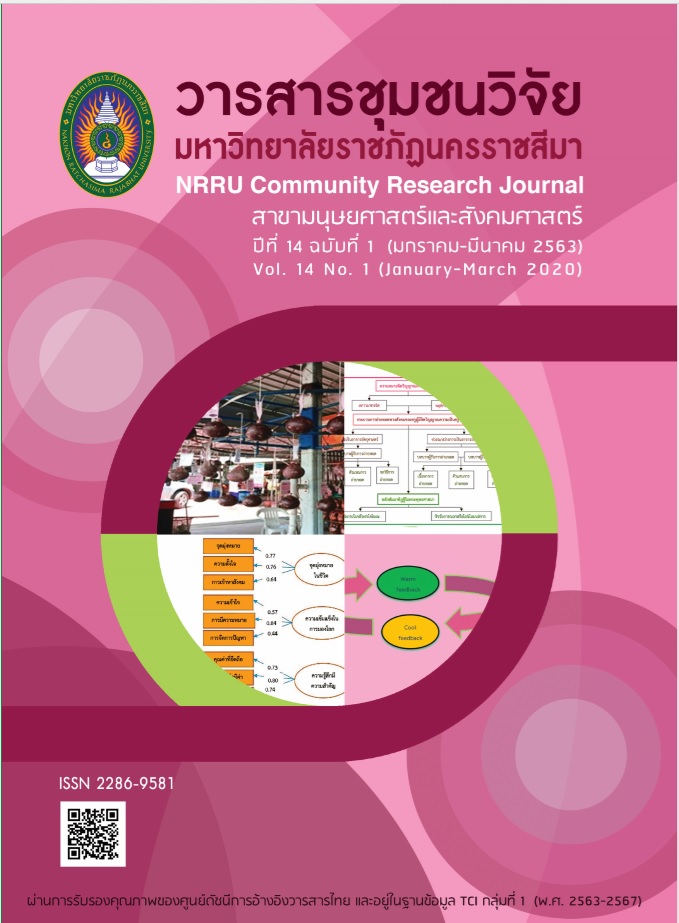การมุ่งเน้นความเป็นผู้ประกอบการและความได้เปรียบทางการแข่งขันที่ส่งผลต่อผลการดำเนินงานของธุรกิจขนาดกลางและขนาดย่อมอุตสาหกรรมอาหาร ในกลุ่มจังหวัดภาคตะวันออกเฉียงเหนือตอนล่าง
DOI:
https://doi.org/10.14456/nrru-rdi.2020.20คำสำคัญ:
การมุ่งเน้นความเป็นผู้ประกอบการ, ความได้เปรียบทางการแข่งขัน, ผลการดำเนินงานขององค์การบทคัดย่อ
การวิจัยครั้งนี้มีวัตถุประสงค์เพื่อศึกษา การมุ่งเน้นความเป็นผู้ประกอบการและความได้เปรียบทางการแข่งขันที่ส่งผลต่อผลการดำเนินงานของธุรกิจขนาดกลางและขนาดย่อมอุตสาหกรรมอาหารในกลุ่มจังหวัดภาคตะวันออกเฉียงเหนือตอนล่าง ประชากรที่ใช้ในการวิจัยได้แก่ ผู้ประกอบการธุรกิจขนาดกลางและขนาดย่อมอุตสาหกรรมอาหารประกอบด้วย นครราชสีมา ชัยภูมิ บุรีรัมย์ และสุรินทร์ จำนวน 306 ราย โดยคำนวณหากลุ่มตัวอย่างที่ระดับความเชื่อมั่นร้อยละ 99 ได้เท่ากับ 214 ราย และใช้แบบสอบถามเป็นเครื่องมือในการวิจัย สถิติที่ใช้ในการวิเคราะห์ข้อมูลประกอบด้วยสถิติเชิงพรรณนา ได้แก่ ค่าความถี่ ค่าร้อยละ ค่าเฉลี่ย ค่าเบี่ยงเบนมาตรฐาน และสถิติเชิงอนุมาน ได้แก่ การวิเคราะห์ถดถอยพหุคูณเพื่อใช้ทดสอบสมมติฐานการวิจัย โดยผลการวิจัยพบว่า การมุ่งเน้นความเป็นผู้ประกอบการด้านการดำเนินงานเชิงรุก (β=0.33, p<0.01) และความได้เปรียบทางการแข่งขันด้านการเป็นผู้นำด้านต้นทุน (β=0.22, p<0.01) ส่งผลกระทบต่อผลการดำเนินงานของธุรกิจอย่างมีนัยสำคัญทางสถิติที่ระดับ 0.01 ส่วนการมุ่งเน้นความเป็นผู้ประกอบการด้านความมีนวัตกรรม (β=0.12, p<0.05) และความได้เปรียบทางการแข่งขันด้านการมุ่งตลาดเฉพาะส่วน (β=0.17, p<0.05) ส่งผลกระทบต่อผลการดำเนินงานของธุรกิจอย่างมีนัยสำคัญทางสถิติที่ระดับ 0.05 ตามลำดับ ซึ่งการมุ่งเน้นความเป็นผู้ประกอบการและความได้เปรียบทางการแข่งขันสามารถร่วมกันพยากรณ์ผลการดำเนินงานของธุรกิจ เท่ากับร้อยละ 68 (AdjR2=0.68) ดังนั้นผู้ประกอบการควรให้ความสำคัญกับการมุ่งเน้นความเป็นผู้ประกอบการในด้านการดำเนินงานเชิงรุก และด้านความมีนวัตกรรม ความได้เปรียบทางการแข่งขันในด้านการเป็นผู้นำด้านต้นทุนและด้านการมุ่งตลาดเฉพาะส่วน เพื่อส่งเสริมให้องค์การมีประสิทธิภาพทางกระบวนการบริหารและสร้างกำไรสูงสุด ผลักดันให้องค์การก้าวไปข้างหน้าด้วยการเป็นผู้นำทางการตลาด พร้อมนำนวัตกรรมเทคโนโลยีใหม่ ๆ มาเสริมสร้างผลิตภัณฑ์ให้ทันต่อการเปลี่ยนแปลงและการแข่งขันที่รุนแรงมากขึ้น
เอกสารอ้างอิง
Chainikom, S. (2011). The Effects of Entrepreneurial Capability in Performance of SMEs in North-Eastern of Thailand. Thesis, Master of Business Administration in Technology and Electronic Commerce Management, Mahasarakham University, Mahasarakham. (In Thai)
Chandrachai, A. (2015). Balanced Scorecard (14th ed.). Bangkok : Chulalongkorn University Printing School. (In Thai)
Covin, J. G., & Slevin, D. P. (1991). A Conceptual Model of Entrepreneurship as Firm Behavior. Journal Entrepreneurship Theory and Practice, 16(1), 7-25.
David, F. R., & David, F. R. (2015). Strategic Management: A Competitive Advantage Approach, Concepts and Cases (15th ed.). Boston : Pearson Education.
Department of Industrial Works (DIW). (2019). Factory Information by Area. Retrieved January 18, 2019, from http://www2.diw.go.th/factory/tumbol.asp (In Thai)
Dess, G. G., McNamara, G., Eisner, A. B., & Lee, S. H. (2018). Strategic Management (9th ed.). New York : McGraw-Hill Education.
Ditthaanunt, P. (2016). The Effect of Supply Chain Management Practices and Supply Chain Responsiveness on Organization’s Competitive Advantage: Case of Food Industry in Thailand. Thesis, Master of Business Administration, Rajamangala University of Technology Isan, Nakhon Ratchasima. (In Thai)
Frese, M. (2000). Success and Failure of Micro Business Owners in Africa: A Psychological Approach. United States of America : Greenwood Publishing Group.
Heizer, J., & Render, B. (2014). Operation Management: Sustainability and Supply Chain Management (11th ed.). Boston : Pearson Education.
Jiraphanumes, K. (2010). The Effect of Entrepreneurial and Strategic Orientation on Innovativeness and Performance: The Empirical Study of the Listed Companies in the Market for Alternative Investment (mai). Thesis, Master of Business Administration, Walailak University, Nakhon Si Thammarat. (In Thai)
Kaplan, R. S., & Norton, D. P. (1996). The Balanced Scorecard: Translating Strategy into Action. Boston : Harvard Business School Press.
Khaimook, K. (2003). Fundamental Statistics. Bangkok : Numfon company publishing. (In Thai)
Li, S., Ragu-Nathan, B., Ragu-Nathan, T. S., & Rao, S. S. (2006). The Impact of Supply Chain Management Practices on Competitive Advantage and Organizational Performance. Omega, 34(2), 107-124.
Lumpkin, G. T., & Dess, G. G. (1996). Clarifying the Entrepreneurial Orientation Construct and linking it to Performance. Academy of Management Review, 21(1), 135-172.
Miller, A., & Dess, G. G. (1996). Strategic Management (2nd ed.). New York : McGraw-Hill.
Office of Small and Medium Enterprises Promotion (OSMEP). (2015). Thai SMEs and the Advancement to the ASEAN Economic Community. Retrieved June 20, 2018, from https://www.sme.go.th/upload/mod_download/The%20ASEAN%20SME%20Regional%20Development%20Fund%20-%20Conceptual%20Framework.pdf (In Thai)
Porter, M. E. (1980). Competitive Strategy: Techniques for Analyzing Industries and Competitions. New York : Free Press.
Rovinelli, R. J., & Hambleton, R. K. (1977). On the Use of Content Specialists in the Assessment of Criterion Referenced Test Item Validity. Dutch Journal of Educational Research, 2(2), 49-60.
Srisatidnarakul, B. (2010). Research methods: guidelines for success. Bangkok : You & I Inter media Publishing. (In Thai)





